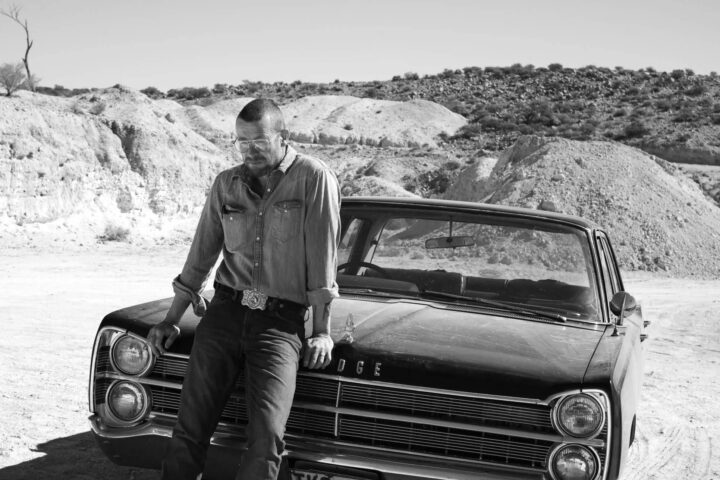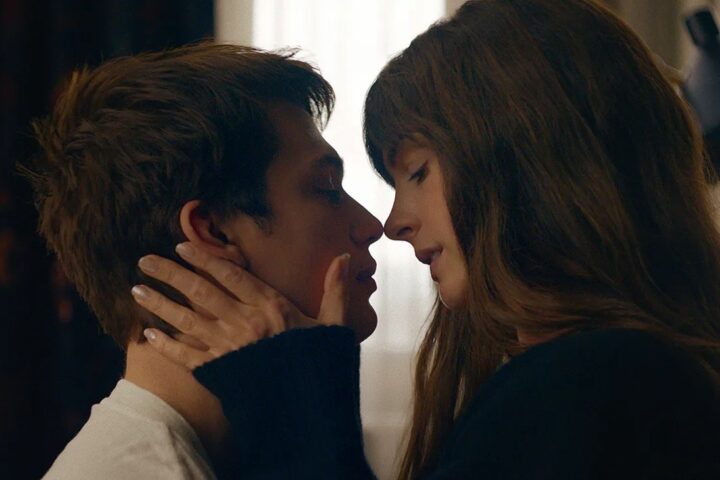By taking the tricks and tropes associated with films about occult goings-on and applies them in the context of a 1970s talk show, Australian writer-directors Cameron and Colin Cairnes have conjured up a horror flick that’s devilishly fun. Late Night with the Devil sets the scene with a montage, authoritatively narrated by Michael Ironside. Day after day, news programs report on the Watergate scandal, the Manson family, and other offenses as if on loop. Perhaps that’s why there’s such an appetite for the likes of Johnny Carson—well-groomed, quick-witted men who who almost nightly offer a sense of order and familiarity to an increasingly anxious populous, a feeling that maybe things will be alright after all.
Jack Delroy (David Dastmalchian) is no Johnny Carson. His quaint Midwestern charms earned his late-night show, Night Owls with Jack Delroy, a respectable following, but it was clear that he would sell his soul for a chance to take that number one spot. On the Halloween night of 1977, with Sweeps Week just beginning, ratings on the slide, and his contract about to expire, Jack decides to go for broke with one last desperate Hail Mary of a show. For the rest of Late Night with the Devil, we’ll be watching this episode play out in real time, ad breaks and all.
The night’s big guests are Lilly (Ingrid Torelli), a young girl who claims to be possessed by a demon called “Mr. Wiggles,” and Dr. June Ross-Mitchell (Laura Gordon), a Stanford-certified expert on all things demonic. To give the show a little extra bite, Jack also brings in Carmichael the Conjurer (Ian Bliss), an arrogant, cigar-chomping illusionist turned sceptic who now offers $100,000 to anyone whose supernatural claims he’s unable to debunk. Under pressure from Jack, Dr. Ross-Mitchell draws out Lilly’s unholy inhabitant live on air, to which Carmichael responds by putting on a hypnotism-induced show of terror of his own.
Between them, they hit all the familiar beats of an exorcism-themed movie, from projectile vomiting to a young girl saying very grown-up things in a creepy, too-deep voice. (Torelli is a striking presence, smiling into the camera with a sort of piercing placidity that’s as unsettling as anything Lilly gets up to once Mr. Wiggles has completely taken over her body.) And the further things go off the rails, the more the film revels in its retro special effects. The practical work here is as viscerally splattery as you would hope, especially during a show-stopping sequence involving worms crawling out of a person’s stomach. The digital effects are deliberately shoddy in a way that gives them a kitschy ’70s charm, though it does also detract from their impact.
It’s possible that the Cairnes brothers go a little too far and too fast when it comes to these dark arts. By the halfway point, we’ve seen enough to remove any doubt that Lilly is indeed possessed by a demon. This decision robs the story of some of its tension, skipping over the eerie, unsettling portion of a horror film where we’re unsure just how bad things are going to get.
During the ad breaks, Late Night with the Devil switches to black and white (maintaining the 4:3 aspect ratio of an old-school TV broadcast) and takes us behind the scenes where Jack and his down hard liquor and smoke cigarettes, wondering just how far they should push things in their quest for ratings. Via tracking shots, the camera snakes its way between the artists, technicians, and assorted odd-jobbers whose frantic efforts keep shows like Night Owls with Jack Delroy running so smoothly. It’s a fun glimpse into the chaotic energy that courses under the surface of any live program, though Late Night with the Devil never taps into it as powerfully or wields it as brilliantly as the likes of Ueda Shin’ichirô’s One Cut of the Dead.
When they aren’t making chairs levitate or bewitching members of the show’s staff, Carmichael and Dr. Ross-Mitchell trade barbs about whether Lilly’s condition is supernatural or merely psychological. Sadly, this episode of Night Owls with Jack Delroy suffers the fate all chat show hosts dread—the conversation between the guests is flat, with more time spent sniping over etiquette than arguing about the nature of evil, the existence of Satan, or other, meatier matters. This is arguably an accurate depiction of the level of existential debate you’re likely to find on a late-night talk show, but it still leaves these sections of the film feeling a little drab.
Fortunately, the show and the film are anchored by a man who knows just how to guide them through these rockier moments. Dastmalchian excels as Jack Delroy, exuding the sort of easy affability that makes an audience want to stay up late, listening to his corny zingers. He makes for a charming host, commands real sympathy in the film’s softer moments, and plays the character as a convincingly wholesome figure with just a slight shadow around him, a sense of off-ness you can’t quite place. Maybe it’s just a tinge of grief or regret, lingering behind that showbiz smile, or maybe it’s something more sinister. We eventually get to find out exactly what’s wrong with him and, thanks to Dastmalchian’s commanding performance and the Cairnes brothers’ bag of visual tricks, we also get plenty of thrills along the away.
Since 2001, we've brought you uncompromising, candid takes on the world of film, music, television, video games, theater, and more. Independently owned and operated publications like Slant have been hit hard in recent years, but we’re committed to keeping our content free and accessible—meaning no paywalls or fees.
If you like what we do, please consider subscribing to our Patreon or making a donation.






